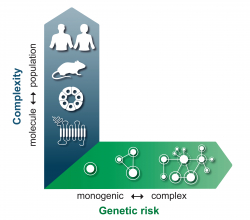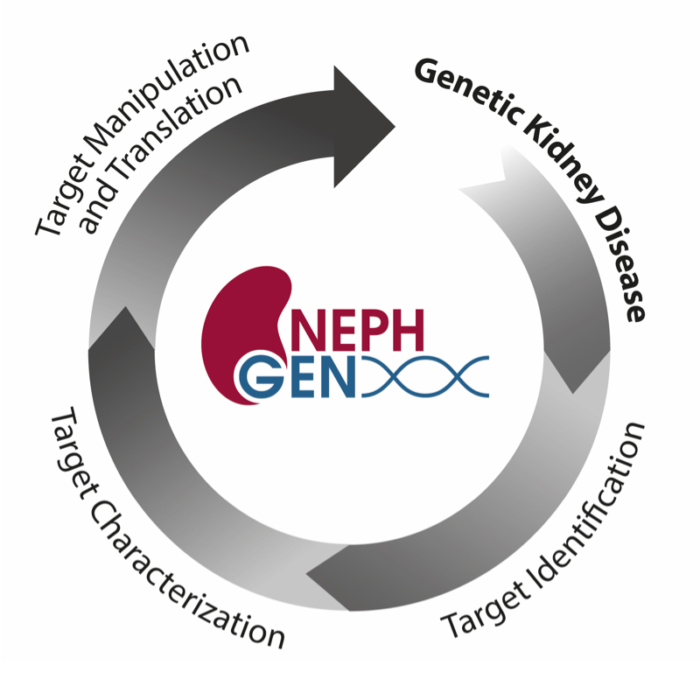Our Approach
Kidney disease represents a global public health challenge. Chronic kidney disease alone affects 10-15% of adults and increases the risk for kidney failure, adverse cardiovascular outcomes, and mortality. Despite the high prevalence and the great costs associated with treating kidney diseases, the low number of clinical trials and specific treatments in nephrology attests to a shortage of therapeutic targets. The identification of druggable targets has been hampered by an incomplete understanding of the mechanisms underlying the etiology and progression of kidney diseases. Pharmacological compounds that operate on proteins or pathways connected to a given disease by human genetic evidence are at least twice as likely to gain approval, compared to those without genetic support. Therefore, the long-term vision of the CRC 1453 is to use evidence from genetic kidney diseases to identify, characterize, and modify molecules and pathways that represent targets to improve the prevention and treatment of kidney disease.
The NephGen Initiative brings together a team of scientists who use genetic evidence and innovative transdisciplinary approaches to uncover the most promising entry points to prevent and treat kidney diseases. The selection of targets supported by human genetics has been shown to double the success rate in clinical development. Kidney disease risk genes will be studied along two axes (Fig. 1): across the spectrum of genetic risk (from monogenic to complex disease) and across the spectrum of species (from molecules to humans). To this end, NephGen investigators have assembled large patient- and population-based registries and cohort studies, have established cutting-edge genome-editing, -omics, imaging, as well as integrative data analysis techniques, and generated diverse disease models in flies, fish, frogs, and mice. We strongly believe that the best science will result from interdisciplinary collaborations that can flexibly adjust the optimal setting to answer a scientific question along and across these axes.

Figure 1: The NephGen approach to study genetic kidney disease.
Kidney disease risk genes will be studied in the space defined by genetic risk (green axis) and complexity of context (blue axis)
Our Goals
The central research goals of the CRC 1453 (Fig. 2) are to use human genetic evidence in order to
- identify novel molecular targets to prevent and treat kidney diseases
- understand their function, both individually and within their respective signaling pathways and protein networks, and
- effectively manipulate these targets using pharmacological and genetic approaches to establish a basis for new approaches to treat and prevent kidney diseases.

Figure 2: Conceptual Framework of NephGen.
Genetic kidney diseases are the basis for the identification, characterization and manipulation of potential therapeutic targets with the long-term goal to improve kidney disease outcomes.
We strongly believe these goals are worth pursuing in a long-term, concerted effort. While the central goals of our CRC therefore remain unchanged, we propose to shift our emphasis on efforts related to the in-depth experimental and in silico analysis of already identified target genes and proteins in a second funding period, aiming to move results of the first funding period towards clinical applications. This includes studies of their upstream and downstream signaling components and/or interactors, which will result in the identification of additional, new candidate molecules and pathways. The success of such efforts is greatly facilitated by numerous genetically tractable animal models, genome-editing technologies, state-of-the-art omics and imaging techniques, as well as advanced methods for integrative data analysis, all of which our team has successfully established during the first funding period.





